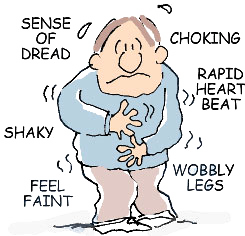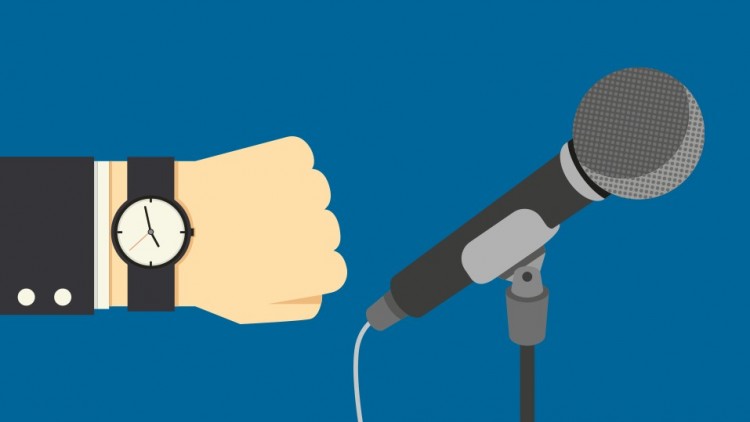Strictly Speaking About Public Speaking

There’s nothing like that collective groan of dismay you and your classmates would make whenever a teacher even so much as hinted at presenting your project or assignment in front of the class.
There’s something about public speaking that instantly makes palms sweat and stomachs knot but is there a reason why public speaking is promoted? Is it actually beneficial to us?
The answer, although some of you may hate to hear this, is absolutely!!
Public speaking actually originated during Ancient Greece where the men were required to give speeches as part of their civic duties or to defend themselves during an assembly at court (no such thing as demanding a lawyer during those times).
Public speaking was also used for entertainment as citizens would all meet in the marketplace and debate issues such as politics and the current economy. If you were a well-known public speaker, you were invited to all the cool spots and allowed to hang out with the wealthy Greeks.
And even now, in the 21st century, public speaking and career success go hand in hand. It can make the difference between landing your dream job, getting your ideal salary or even delivering the most show stopping, tear inducing speech at your best friend’s wedding.
Because public speaking is intertwined with most aspects of modern living, it is essentially unavoidable!!
If it’s so beneficial, why are we so scared of it..?
Glossophobia is the fancy term we give to the actual fear of public speaking and this can often prevent you from taking risks to share your ideas, performing well in assignments and in more serious terms, how we grow personally and professionally. Now this being said, there are probably only a handful of people who have received a glossophobe diagnosis. The rest of us, although we don’t find it an enjoyable process, just get through and come out the other side a bundle of relief. The problem is that our brains are set up to overestimate risk before the public speaking ever begins. This being said, psychologists have noticed that our fear of public speaking is not so much related to the quality of a speech as it is, but how speakers feel, act and think when approaching the task. So, in order to be able to tackle our nerves, we have to first understand the theories surrounding the factors that influence them. There are three main contributors:

- Physiology
This may seem the most obvious but is also the most important. That nervous feeling we get just before going up to deliver our speech or presentation involves the arousal of the autonomic nervous system which activates under the impression that we are about to encounter a potentially threatening stimulus. It’s a bit of a dramatic system but can also save our lives in times of actual threat. And what do we do when confronted with a threat that our ancestors taught us? Yes; its fight or flight time. Because our body knows its fight time, it prepares us for battle – with lots of adrenaline.
Although this works well for us in a physical fight situation, this hyperarousal can also give us the emotional experience we know so well as fear. And as we all know, fear can interfere with our ability to perform comfortably in front of audiences.
Let’s take the classic example of Mia Thermopolis in the movie The Princess Diaries (undoubtedly the best film ever). Mia, as we learn throughout the film, hates public speaking, so much so that she even gets sick while having to perform a debate in front of her classmates. Here, her fear has completely taken over and has led to anxiety which causes her to get sick. And no doubt from that experience, she will not be willing to publicly speak any time in the near future. But hold this thought as I will be bringing her back as an example later in this blog.

- Our Thoughts
We all know that our thoughts can be our best friend or they can be our worst enemy. They can make us overthink something as minor as a text but can also help us see the bigger picture and be creative. When it comes to public speaking, when I say our feelings of dread are all made up in our head…they really are! It is our mind and how we interpret a situation that makes our body react accordingly. If we perceive the task as a threat, our body will react accordingly as mentioned above. So what is it we fear? Fear often arises when people over estimate the stakes of communicating their ideas in front of others. Fear can make us view public speaking as a potential threat to our credibility and self-image. Having negative thoughts such as ‘I’m a terrible public speaker, I’m going to mess up and everyone is going laugh’ will increase our fear and ultimately make us quite anxious. And none of us want to end up like poor Mia do we?
Research has suggested that there are two types of ways that we can view public speaking.
- Performance Orientation
- Communication Orientation
If you lean towards the Performance Orientation, you view public speaking as something that requires special skills and the audience are judges who are evaluating how good of a public speaker you are.
On the other hand, Communication Orientation revolves around the concept that the main focus of your public speech is to express your ideas or tell your story. Communication Orientated people view public speaking quite similarly as we would view having an ordinary conversation with another individual. In both cases you are sharing your thoughts and views with other people. By analysing both orientations, it’s clear that viewing public speaking as a communicative method is a much better outlook. However….although it’s a better outlook, we can’t just snap our fingers and suddenly view public speaking as a conversation. It takes a bit more work than just knowing about that point of view.
Moving onto the last, but certainly not least main influence which basically boils down to:

- Skills
Skill contribute massively to your perception of public speaking. While there are many people out there who consider themselves to be naturally good at communicating, there is always room for growth. Research shown that in general, people who work on their skills, instead of always relying on natural talent, tend to be more successful in that skilled area. This is always something worth noting not only for public speaking but just in life in general.
So….what are the top tips to bear in mind when being approached with the dreaded task?
Coincidently enough, the three factors mentioned above that cause the dread we feel, are also the three factors researchers have targeted to help overcome it.
- ….And Breatheee

There are a vast amount of techniques that you can use to get your body to relax. One of the oldest and most simple tricks in the book of relaxation techniques is to breathe. I know we do this on a daily basis but by slowing down your breathing and focusing on the movements, you can lower down your heart rate and lesson the tension in your muscles, which automatically send a message to your brain that you may not be as threatened as you initially thought you were. Relaxation techniques such a controlling your breathing often work best with gradual exposure to public speaking.
2. It’s all about perspective.

Despite the fact that you won’t wake up one morning with your perspective suddenly shifted from being Performance Orientated to Communication Orientated, we can change our mental approach in little steps. Overtime, you can train your brain to view public speaking as a situation where you are just communicating beneficial information to people something. Eventually this shift in perspective will relieve you of the worry of how you will come across and focuses you and your mind on how to best get your message out.
I know that towards the end of The Princess Diaries, Mia delivers an absolutely show stopping speech (I am probably very biased as it may not have been showstopping but it was definitely a step up from her vomiting on the stage days). Her perspective most definitely changed over the course of the movie and the reason her last speech of the movie was such an improvement was because she knew what she wanted to say, and she knew her people would benefit greatly from it. She is Amelia Mignonette Thermopolis Renaldi, Princess of Genovia after all.
3. Fail to prepare, prepare to fail.

A public speaking appearance should in essence be the culmination of a well-practiced and well-rehearsed presentation. The more prepped you are and the more you understand what you will be talking about, the less worried you will be about looking nervous. I know a lot of movies show characters making incredible speeches on the spot without any apparent rehearsing but this is where we take real life examples. Some of our world’s greatest public speakers; Barack Obama, Martin Luther King, Winston Churchill even, all practiced and prepared immensely before their speeches. And if they could achieve success with the world watching, you can most definitely achieve it with your class.
Et voila, the secret recipe to overcoming the crippling fear of public speaking. From one glossophobe to another, WE CAN DO IT!!
Yours sincerely,
The Motus Movement